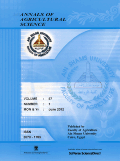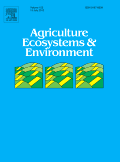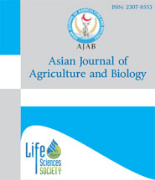
Agrociencia Uruguay
metrics 2024
Exploring the Depths of Agronomy and Plant Science
Introduction
Agrociencia Uruguay, published by the Universidad de la República, Facultad de Agronomía, serves as a vital academic platform in the field of agricultural and biological sciences. Since its inception in 1997, this Open Access journal has fostered the dissemination of innovative research findings, promoting collaboration among researchers, professionals, and students interested in agronomy, crop science, soil science, and plant science. Operating from Montevideo, Uruguay, the journal strives to address contemporary challenges in agriculture through the publication of high-quality, peer-reviewed articles. Despite its relatively modest impact factors and rankings in Scopus, positioned in the lower percentiles, Agrociencia Uruguay remains crucial for advancing local and regional agricultural knowledge, thus contributing to global food security and sustainable practices. Researchers are encouraged to engage with the journal's content to further enhance their understanding and explore the rich agricultural landscape of Uruguay and beyond.
Metrics 2024
 -
- 0.40
0.40 0.50
0.50 -
-Metrics History
Rank 2024
IF (Web Of Science)
JCI (Web Of Science)
Quartile History
Similar Journals

ANNALS OF AGRICULTURAL SCIENCES
Leading the Way in High-Impact Agricultural ResearchANNALS OF AGRICULTURAL SCIENCES, published by Elsevier, stands as a leading open access journal dedicated to the multifaceted field of agricultural sciences. Since its inception in 2011, this journal has served as a pivotal platform for the dissemination of high-quality research, covering areas such as agronomy, animal science, horticulture, food science, plant science, and soil science. With an impressive Q1 ranking across multiple disciplines and notable positions in Scopus Ranks—including #6 in Animal Science and Zoology and #3 in Horticulture—this journal is recognized globally for its significant contribution to advancing agricultural innovations. The journal caters to a diverse audience of researchers, professionals, and students, providing them with open access to cutting-edge studies that address critical issues in agricultural productivity and sustainability. Its commitment to high-impact research ensures that articles contribute meaningfully to the scientific community, fostering advancements in agricultural practices and policies.

Bulgarian Journal of Agricultural Science
Bridging Theory and Practice in Agricultural SciencesThe Bulgarian Journal of Agricultural Science, with ISSN 1310-0351, is a distinguished scholarly publication dedicated to advancing the field of agricultural and biological sciences. Published by the Scientific Issues National Centre Agrarian Sciences in Bulgaria, this journal serves as a vital platform for researchers, professionals, and students to disseminate significant findings and innovative approaches within the agricultural sector. The journal operates under an Open Access model and has consistently published research from 2008 to 2024, ensuring timely dissemination of knowledge. With a current impact factor that places it in the Q3 quartile in both Agricultural and Biological Sciences and Veterinary categories, it reflects a commitment to quality and relevance in research. Furthermore, the journal is indexed in Scopus, showcasing its global visibility and outreach. The Bulgarian Journal of Agricultural Science is pivotal for those aiming to contribute to sustainable agricultural practices and veterinary advancements, fostering a robust dialogue among scholars and practitioners alike.

AGRICULTURE ECOSYSTEMS & ENVIRONMENT
Innovating Research for a Greener TomorrowAGRICULTURE ECOSYSTEMS & ENVIRONMENT is a premier journal published by Elsevier, specializing in the fields of agronomy, animal science, and ecology. With an impressive impact factor reflective of its stature, it ranks in the top quartile (Q1) across three significant categories, highlighting its critical role in advancing research within the agricultural and environmental sciences. The journal serves as a vital platform for disseminating high-quality research that addresses the complex interactions between agriculture and ecosystems, providing insightful methodologies and findings that inform sustainable practices. As the journal continues to converge from 1983 and through to 2025, it remains committed to offering both traditional and innovative access options while contributing to the academic community's understanding of pressing environmental challenges. Researchers, professionals, and students are encouraged to engage with the journal's comprehensive content, which is positioned among the elite in its fields, having achieved top rankings in Scopus across relevant disciplines.

AGROCHIMICA
Connecting tradition with innovation in crop and soil science.AGROCHIMICA is an eminent journal published by PISA UNIV PRESS, dedicated to advancing the fields of Agronomy, Crop Science, Food Science, and Soil Science. With a rich history dating back to its inception in 1973, this journal has evolved through various phases of publication, illustrating its commitment to delivering quality research over several decades. Although currently categorized in the Q4 quartile across its respective disciplines, AGROCHIMICA provides a platform for foundational and innovative studies that contribute to knowledge in agricultural practices and sustainable food systems. While the journal is not open access, it remains a valuable resource for researchers, professionals, and students interested in Italy's and the global agricultural landscape, fostering a greater understanding of the complexities within these interconnected fields. The ISSN associated with this journal is 0002-1857, and it is published from Pisa, Italy, addressing the evolving challenges in agriculture with a spotlight on rigorous scientific inquiry.

REVISTA DE LA FACULTAD DE CIENCIAS AGRARIAS
Empowering Researchers with Open Access Insights.REVISTA DE LA FACULTAD DE CIENCIAS AGRARIAS is an esteemed academic journal published by UNIV NACIONAL CUYO, FAC CIENCIAS AGRARIAS, located in Chacras de Coria, Mendoza, Argentina. As a pivotal publication in the fields of Agronomy and Plant Science, it has achieved a commendable Q2 ranking in both categories, indicating its relevance and impact within the scientific community. Since its establishment as an Open Access journal in 2007, it has facilitated the dissemination of crucial research, fostering collaboration and innovation among researchers, professionals, and students alike. The journal's converged years from 2008 to 2024 allow it to present contemporary advancements and discussions related to agricultural practices and plant sciences. With a strong commitment to quality and accessibility, REVISTA DE LA FACULTAD DE CIENCIAS AGRARIAS provides a valuable platform for those engaged in the crucial exploration of sustainable agricultural methodologies and plant innovations.

Agrisost
Advancing sustainable agriculture for a thriving future.Agrisost is a prominent, peer-reviewed Open Access journal dedicated to advancing research in the fields of agriculture and sustainable development. Published by the University of Camagüey Ignacio Agramonte Loynaz in Cuba, this journal has been providing researchers and professionals with a platform to disseminate their findings since 2011. With its unique focus on the challenges and innovations in agricultural practices, Agrisost aims to bridge the gap between theory and application, fostering a collaborative environment for scientists, practitioners, and students alike. The journal’s commitment to open access ensures that a diverse audience can access high-quality research without barriers, making it an invaluable resource for anyone engaged in agricultural sciences. Researchers and students are encouraged to contribute their insights and findings to help shape the future of sustainable agriculture and food security.

Revista Fitotecnia Mexicana
Advancing Agricultural Knowledge for a Sustainable FutureRevista Fitotecnia Mexicana is a prominent academic journal published by the SOC MEXICANA FITOGENETICA, dedicated to advancing knowledge in the fields of agronomy, crop science, genetics, horticulture, and plant science. With its establishment dating back to 2007 and currently running through 2024, this journal serves as an important platform for researchers, professionals, and academic institutions interested in plant genetic resources and agricultural innovations. Although it holds a Q4 quartile ranking in various categories and is positioned within the lower percentiles in Scopus rankings, it provides crucial insights and opportunities for emerging ideas and local research initiatives. Based in Mexico, and with its indexed ISSN 0187-7380, the journal plays an important role in stemming from the rich agricultural heritage of the region. The lack of open access options underscores the depth of curated content provided, making it a valuable resource for professionals seeking to expand their expertise in the sector.

Asian Journal of Agriculture and Biology
Transforming research into practice for sustainable agriculture and health.Welcome to the Asian Journal of Agriculture and Biology, a premier open access journal published by LIFE SCIENCES SOC PAKISTAN, dedicated to advancing research in the fields of agricultural and biological sciences. Since its inception in 2013, this journal has provided a vital platform for scholars and practitioners to disseminate novel findings and innovative methodologies that contribute to the betterment of agricultural practices and biological research. With an impressive H-Index and ranked in the Q3 category across multiple disciplines including Agricultural and Biological Sciences, Biochemistry, Genetics, and Molecular Biology, as well as Medicine, the journal showcases high-quality research that influences both academic and practical applications globally. The journal is indexed in Scopus, reinforcing its commitment to high academic standards and providing researchers with efficient access to significant knowledge. Based in Pakistan, the Asian Journal of Agriculture and Biology is your gateway to staying abreast of the latest trends and discoveries that support sustainable development and health sciences.

Revista de Ciencias Agricolas
Cultivating Knowledge for Sustainable FuturesRevista de Ciencias Agricolas, published by UNIV NARINO, is a prominent open-access journal dedicated to advancing the field of agricultural sciences. Since its inception in 1969, this journal has been an invaluable resource for researchers, professionals, and students alike, focusing on a wide array of topics that include sustainable farming practices, agricultural technology, and rural development. With the ISSN 0120-0135 and the E-ISSN 2256-2273, the Revista de Ciencias Agricolas ensures broad accessibility to its research articles, facilitating a wider dissemination of knowledge within the agricultural community. Situated in San Juan Pasto, Nariño, Colombia, the journal is committed to providing high-quality content that addresses both local and global agricultural challenges, thereby contributing to the enhancement of food security and livelihoods across diverse populations. The journal's inclusive approach not only fosters academic discourse but also encourages innovative solutions within the agricultural sector, making it an essential platform for knowledge exchange in this vital area of study.

Agrarforschung Schweiz
Pioneering insights into the future of food and environmental stewardship.Agrarforschung Schweiz is a premier journal dedicated to advancing the fields of agronomy, animal science, food science, and environmental studies. Published by AGRARFORSCHUNG in Switzerland, this journal serves as a vital platform for the dissemination of research findings that address contemporary challenges in agriculture and food systems. With an emphasis on open access, researchers and practitioners are encouraged to share their work, fostering a collaborative environment for knowledge exchange. Although currently listed in Q4 of several agricultural categories, the journal is poised for growth and aims to enhance its impact within the academic community. It features a wide range of topics from innovative agricultural practices to sustainability and pollution management, catering to a diverse audience of researchers, students, and industry professionals. Given the rich agricultural heritage of Switzerland, Agrarforschung Schweiz aspires to contribute meaningfully to global discussions and advancements in agricultural sciences through rigorous peer-reviewed research and insights.